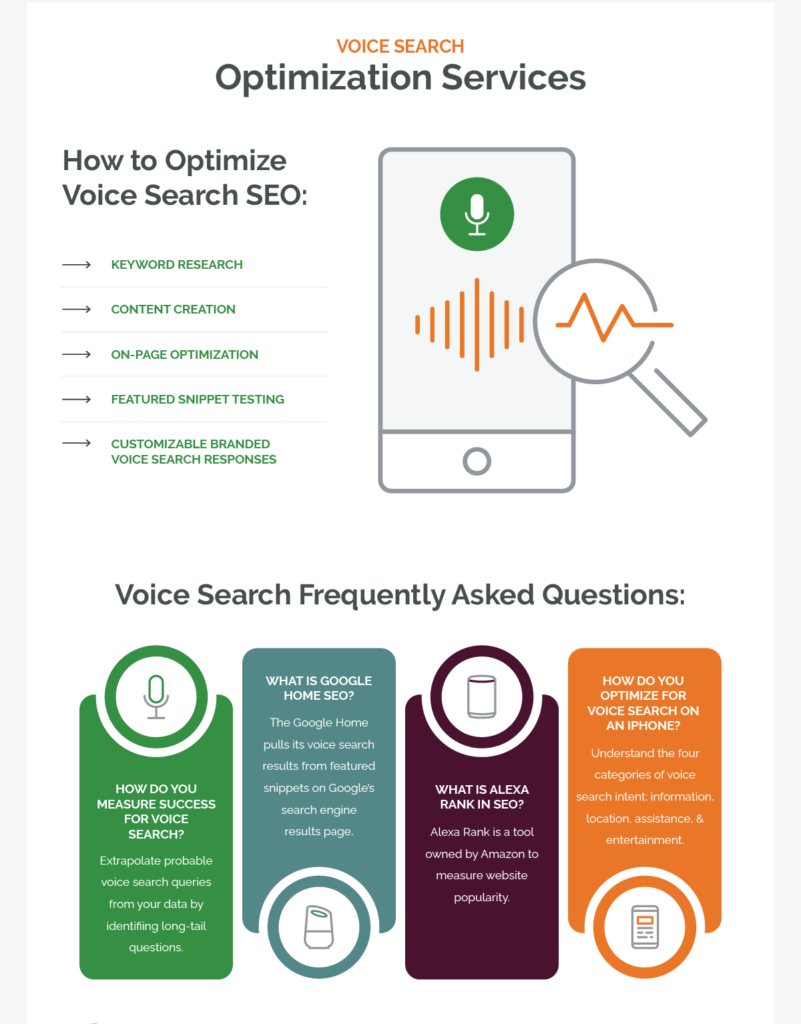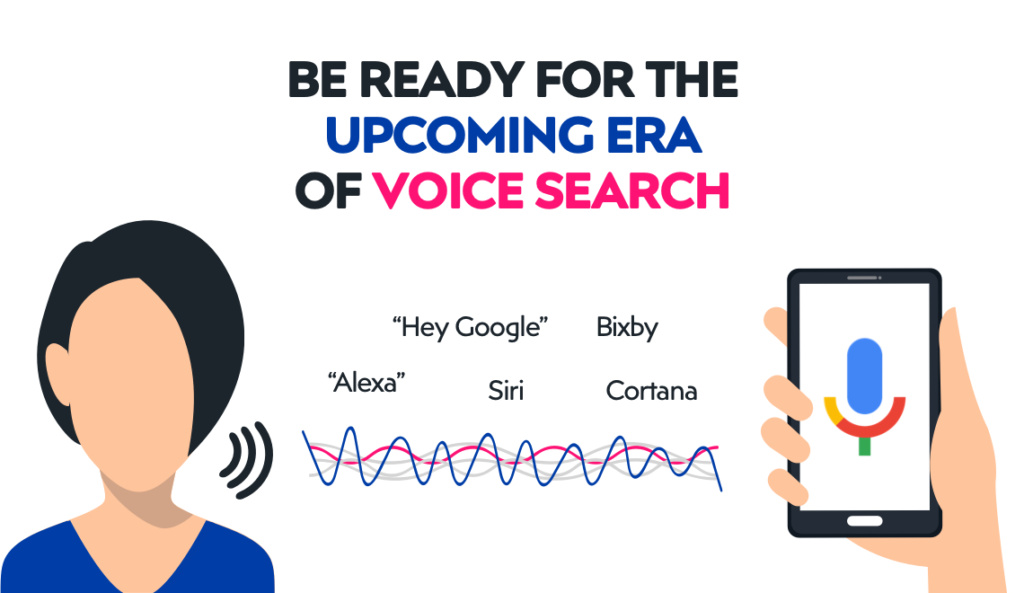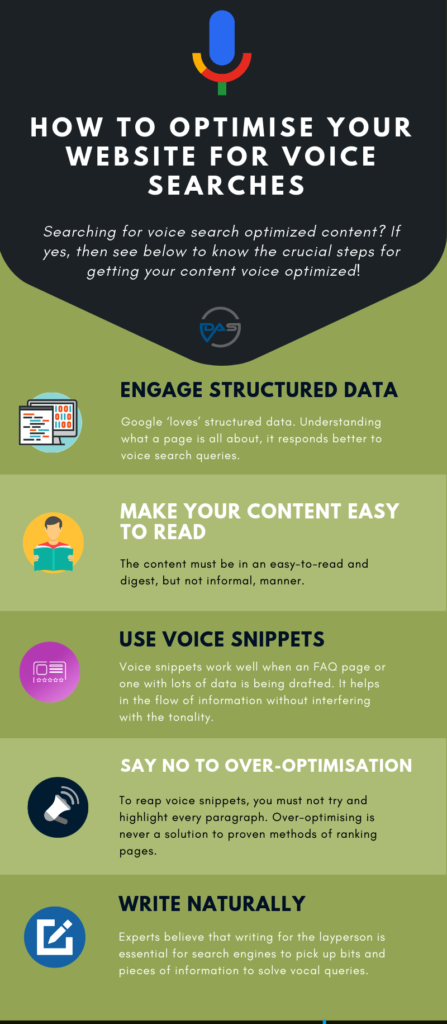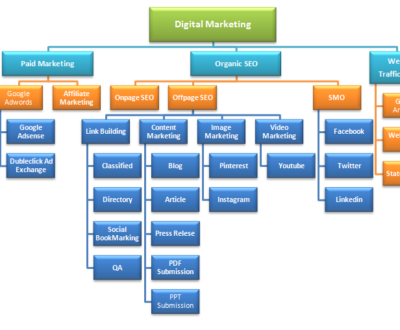In an uber-connected world, where we are constantly on the move along with our gadgets, it was only a matter of time before the way we searched for things online changed.
A tectonic shift has been noticed towards voice-based searches, as opposed to text-based ones.
Two of the giants of the search industry – Google and Microsoft’s Bing- have stated that a majority of their search queries are placed via voice on mobiles.
Given the hands-free and wireless nature of voice searches, not to mention its ease, more and more people are gravitating towards them. The industry was bracing for this shift, but it came too fast for most organisations – Voice search optimization. Google, with its YouTube partnership, controls over 90% of all global searches. As a business leader, it also affects some of the small games and consumer preferences. So when Google Assistant started, Mountain View, the Californian giant also mentioned that online advertising did.
Introducing voice search optimization into content is one such smart tool.

Voice assistants like Siri, Cortana, and Alexa are moving into eCommerce space and it’s crucial for businesses to keep up. Optimizing your website for voice search can turn out to be a great victory if used correctly.
Optimizing your website for voice search is somewhat different than what everyone has been doing so far, especially in eCommerce. The reason for that is simple. Spoken search queries are different than written ones. People are only used to communicating with their cell phones, computers or voice assistants. We live in a time when we can talk about inanimate objects and need satisfying answers. It’s really attractive, isn’t it?
In today’s article, you’ll find everything you need to know about voice search and the best voice search in eCommerce! Whether you’re starting an e-commerce business or want to improve your current business process, we’re happy to help! We are experts in e-commerce app development, so if you’re looking to go mobile, look no further.
However, let’s learn more about the subject now!
Stand on sound search
Voice search uses words as a way to interact with a search engine, which is easier than typing in a search term. Talk to your PDA or mobile phone and get satisfying answers.
Currently, the most popular providers are Amazon Echo, Cortana from Microsoft, Siri from Apple or Google Home.

But the most important thing to check is that you now have a digital assistant in your pocket! So how far can this go? Let’s focus on a few facts.
By 2020, more than 50% of all online searches will be done using voice search.
According to Voicebot, 25% of customers in 2017 use voice services for holiday shopping.
According to Google, 20% of all mobile searches are done using voice search.
As you can see, voice search has been extremely rewarding. If marketers don’t focus on developing a solid SEO strategy, the benefits can be devastating.
Running an e-commerce website has many benefits that can be further enhanced if voice SEO is used correctly. It can save both consumers and businesses money, and having your online store open 24/7 gives you and your business more freedom. and interest.
With all of this taken into consideration, the best time to jump in the sphere of voice search optimization is right now!
Voice search – Your new SEO secret weapon
Yes. It’s a weapon and it’s secret. A marketing weapon that’s so secretive that 62% of marketers still have no plan in taking voice search optimization in the account. That number is highly alarming. As we suggest, the best time to take action is as soon as possible!
To properly use voice search as your secret weapon, you must first understand why do customers even use voice search. One word – multitasking.
According to a Google report, 38% of users use voice search while watching TV and 23% of users use voice search while cooking. Others do it while walking, driving, or performing routine tasks.
Voice search reduces the time spent searching for devices and searching for answers. The basis of using voice search is to improve the efficiency and speed of data collection. Voice search is popular for getting information or looking up recipes, but it also plays an important role in e-commerce.
How to control voice search in e-commerce?
In order to advance in voice search optimization for e-commerce, you can think of browsing through the list of profitable e-commerce startups.
There are also many blogs (like ours!) where you can find ideas related to achieving your e-commerce goals to provide more information.
There are many ways to improve your website for voice search.
Achieving the “zero position” on Google
How to get ranked “zero” on Google? Well, the answer is simple, you just need to beat the number one entry.

Use local voice search terms to get the most out of it.
According to a BrightLocal report, 58% of consumers use the local voice search industry.
This is not surprising, since most voice requests occur when people are walking or driving to a location. Or, more importantly, when they find a new place or a new business.
People looking for “the best pizza in Zagreb” look for pizzerias nearby. If you have a pizza place and want to attract more customers, you should include cities when setting up your keywords. It is important to understand the importance of user preferences.
More importantly, people perform voice searches with the phrase “around me” multiple times. Search engines now use your location to find out which pizzeria is currently closest to you.
Of course, you don’t have to include “around me” in your context. Search engines can use these phrases to know when to track your location. Choose a semantic idea over an idea based on keywords
Obviously, semantics is the study of words and phrases (or, more easily, words) to create meaning. When searching in search engines, semantic concepts take into account the content of the user’s search, not just the text.
The search engine has been upgraded to the next level. They try to understand the target user and user behavior. They want to understand why users search and how to provide the best answers. The goal is to have a dialogue between search engines and more human users. They achieve this, among other things, by using complex strategies and algorithms to determine the content.
You can mix and match terms, including multiple dots for keywords and phrases that cover all the ways to ask a question.
Ecommerce Search Voice Optimization
You have to use dialogue. As mentioned before, users don’t say what they write. Try to be natural when choosing words and phrases for your theme.
Moreover, e-commerce is a vast field. Success requires more than just solid research. One of the main things you want to do is build a successful eCommerce app.
Mobile apps are a huge part of e-commerce today and must have one. Moreover, one of the main issues is retaining and engaging mobile users. A great way to retain and reach them is through our mobile app loyalty service. There are several reasons why companies should use a fair service.
The mobile app makes it easy to reach potential customers and build relationships. Integrating voice search into your mobile app is a great way to stay ahead of all standards and improve the overall user experience.
Voice search is coming fast, are you ready?
It’s coming and it’s coming fast!
As we discuss the future of SEO, the convenience of having a conversation with a search engine will become more and more common. It’s already widely accepted to ask your device to play your favorite song or to tell you the year when the Roman Empire crumbled.
To show you the real power of voice search, here are more facts that will make you think:
- 72% of parents who own voice-activated speakers have considered shopping using those devices.
- 44% of voice-activated speaker owners, with weekly usage, order products using their devices. 62% of people who regularly use voice prompts are likely to buy something from their device.
- 58% of the average user uses voice chat to manage their weekly subscriptions.
- Now you can think of something you can accomplish using sound SEO tips.
A question remains.
Thinking of improving your business to be competitive?
How to Optimize Your Website for Voice Search

At eWeb Services Pvt. Ltd., content is designed with voice search content in mind. We are building a team with know-how and creative content, so we can deliver a wide range of content in a short time.
Here’s how to ensure reliable voice search optimization for your website:
A. Harness structured data:
When asked about the new SEO changes at PubCon 2018, keynote speaker Gary Illyes, who also returned to PubCon 2019 in Florida, revealed that the website uses data design. Illyes is a Google Webmaster Trends analyst and talks voice search SEO rights rights. Illyes said Google is working on a software upgrade process that will enable successful developers to become better developers, primarily by making Voice Assistant content user-friendly.
John Mueller is even more distracted, pointing out that Google “loves” creating data and can respond to search queries better because it helps the bot understand everything on the page.
- Make your content easy to read.
A word to knock on the door at the start of a voice search benefit is that “conversation” is key here. Content should be readable and digestible, but not legitimate. Mueller is an interesting example in this context. He said that when people explore the tallest mountain in the world, they usually only read the first sentence of the answers mentioned and skip it.
The language is simple. You can do it easily.
3. Using voice snippet:
When it comes to voice search, snippets are more important. For example, a page with tabular information is not in the voice search ranking because it is not easy to read aloud. Reading aloud in these contexts is key to reflection. What’s it like to read aloud when drawing new words? Does it sound like a loudspeaker or does it remind you of a machine trying to bring people together? Speech snippets work well when creating FAQ pages or heavy pages. It facilitates data flow without affecting color tone.
- Refuse to do the best.
Google thinks we’re working too hard to be effective in voice search without optimizing or having enough pregnancy time. Muller also stresses its importance. He warns that content developers on a website should not try to highlight every sentence to get the audio. Over-optimization is not a solution to the page-level verification process. These guidelines include support for accurate research, strict SEO procedures and functional areas, and top-notch content design that avoids shortcuts that Google considers a scam to its algorithms. - Always write:
Muller adds that there is no change in writing for the reader. Regardless of the number of mobile and IoT devices, it’s important to keep in mind that people will inevitably ask different questions than they ask others. This is the core of the Turing test and the inverse Turing test, and the content should be developed in the same way.
Experts believe that public writing is the key for a search engine to gather information to solve questions. New voice research also shows that writing still contributes to the differences between humans and machines when exploring by voice.
How can we help you?
eWeb Services Pvt. ltd. There is a whole set of content search engine optimizers, starting at the bottom of the pyramid. After all, content is still king. We also have our own SEO team to help you make your voice search the best SEO strategy.
Let’s break down the process a bit. Update your local directory. Little things like local listings can add results to a voice search. Usually, to let you know about Google My Business, we write new ads and addresses to ensure better final delivery. Searchers searching for “pizza in Austin near me” or similar searches will be redirected to your website.
We focus on long-term content: before your organization is ready for big online challenges, you need a good idea. eWeb Services Pvt. society uses proven methods of keyword research and usage to provide you better solutions.
We know how people talk and make changes accordingly: Language and linguistics are fluid and generally have no set rules of usage. Dialects may vary in a single city, which makes voice search sound daunting. We can ensure adherence to a single natural language which will deliver results — the result: better and more variable longtail keyword which add value.
We take care of Google Analytics: While there are no concrete reports, Google plans to tweak its popular Search Console reports and suggest which keywords and phrases worked the best. As updates go through, we will provide details accordingly.
Microdata processing: Googlebot uses your microdata website to access millions of web pages and provide the most relevant results. This means that your website’s microdata (in other words, Google Maps) must be correct. We will help you do what it takes. Microdata can include information by route, hours of operation, phone number, and physical location of various files. Help your website pass the mobile-friendly test. Google has its own mobile-friendly reviewer that identifies your website and lets you focus on areas that need to be reworked to be mobile-friendly. Holding your load in place is just one measure. We can help you everywhere. It also follows Google’s own guidelines.
Competitive price and efficiency: eWeb Services Pvt. society We provide you with the best price/value package for your website and solve voice search problems 2019. Guaranteed on-time delivery, check content for plagiarism (on Copyscape compliance) and strong content. .
About us and this blog
We are a digital marketing company with a focus on helping our customers achieve great results across several key areas.
Request a free quote
We offer professional SEO services that help websites increase their organic search score drastically in order to compete for the highest rankings even when it comes to highly competitive keywords.
Subscribe to our newsletter!
More from our blog
See all postsRecent Posts
- What are Web Stories and their importance? July 30, 2022
- What are Paid Ads and Advantages of Paid Ads? July 29, 2022
- How Web 2.0 is Different from the Web 3.0? July 28, 2022














